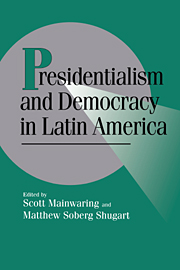Book contents
- Frontmatter
- Contents
- Contributors
- Acknowledgments
- Introduction
- 1 Presidentialism and Democracy in Latin America: Rethinking the Terms of the Debate
- 2 Multipartism, Robust Federalism, and Presidentialism in Brazil
- 3 The Unrealized Potential of Presidential Dominance in Colombia
- 4 Presidential Behavior in a System with Strong Parties: Venezuela, 1958–1995
- 5 Strong Candidates for a Limited Office: Presidentialism and Political Parties in Costa Rica
- 6 Political Sources of Presidencialismo in Mexico
- 7 Evaluating Argentina's Presidential Democracy: 1983–1995
- 8 In Defense of Presidentialism: The Case of Chile, 1932–1970
- 9 Executive–Legislative Relations in Post–Pinochet Chile: A Preliminary Assessment
- 10 Hybrid Presidentialism and Democratization: The Case of Bolivia
- 11 Conclusion: Presidentialism and the Party System
- Appendix: Outlines of Constitutional Powers in Latin America
- References
- Index
6 - Political Sources of Presidencialismo in Mexico
Published online by Cambridge University Press: 05 June 2012
- Frontmatter
- Contents
- Contributors
- Acknowledgments
- Introduction
- 1 Presidentialism and Democracy in Latin America: Rethinking the Terms of the Debate
- 2 Multipartism, Robust Federalism, and Presidentialism in Brazil
- 3 The Unrealized Potential of Presidential Dominance in Colombia
- 4 Presidential Behavior in a System with Strong Parties: Venezuela, 1958–1995
- 5 Strong Candidates for a Limited Office: Presidentialism and Political Parties in Costa Rica
- 6 Political Sources of Presidencialismo in Mexico
- 7 Evaluating Argentina's Presidential Democracy: 1983–1995
- 8 In Defense of Presidentialism: The Case of Chile, 1932–1970
- 9 Executive–Legislative Relations in Post–Pinochet Chile: A Preliminary Assessment
- 10 Hybrid Presidentialism and Democratization: The Case of Bolivia
- 11 Conclusion: Presidentialism and the Party System
- Appendix: Outlines of Constitutional Powers in Latin America
- References
- Index
Summary
INTRODUCTION
Mexico has been characterized as having an exceptionally strong presidency. In no country in Latin America does the president appear to wield such wide-ranging powers. The president in Mexico dominates the legislative and judicial branches of the national government and directs a highly centralized federal system in which states and municipalities ultimately appear to be subject to rule from the center.
There is no question that the president of Mexico exercises an extraordinary range of powers. He can reform the constitution by proposing amendments, which are frequently accepted by Congress with only cosmetic changes. He initiates virtually all legislation, which often is passed by Congress with dispatch. The president designates his own successor to the presidency and also nominates most of the congressional candidates of his party. He also often names the candidates of the official party for governor. He can have governors, mayors, and members of Congress removed from their posts. He designates members of his cabinet and can fire them at his leisure. The federal judicial branch is filled with his appointees, which leads to a compliant judiciary (see Garrido 1989:422–26).
This image of a powerful presidency survives despite the fact that the Mexican constitution provides for an independent congress and judiciary and insists on separation of powers. Furthermore, the 1917 constitution is explicitly federal with regard to relations between the federal government and the states, and it provides for free municipal government. How in fact is the president of Mexico so powerful?
- Type
- Chapter
- Information
- Presidentialism and Democracy in Latin America , pp. 225 - 258Publisher: Cambridge University PressPrint publication year: 1997
- 70
- Cited by



